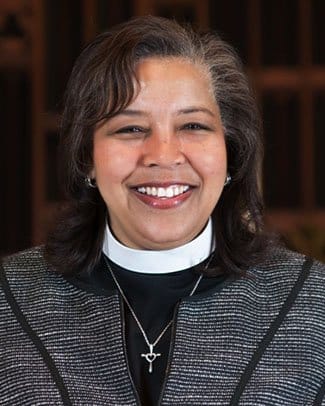Today we cover Carlye Hughes, the 11th bishop of the Diocese of Newark. We conclude that she is mainly useless.
To be sure, we had high hopes when she came into office. Her questions and answers seemed to hit the nail on the head, talking about dealing with churches in decline versus wringing her hands and hoping for the best.
But the reality is proving far different. Indeed, hand-wringing appears to be what Bishop Hughes does best.
We repeatedly hear comments coming from her direction about how she didn’t know she was signing up for this. That’s pretty rich, coming from a former corporate trainer.
Meanwhile, we are tracking 11 different clergy misconduct cases in the diocese. That doesn’t include the Bill Allport allegations, which are a disaster on wheels, perhaps literally. Rudimentary to understanding impairment is the notion that impairment involves dishonesty with self and others. So asking Allport if he is an alcoholic is like asking the fox if it ate the hens.
Hughes inherited a great, stinking crock of goo, poorly managed at every level. But that is past; this is now.
Time to put the big girl miter on and deal with it.
What does that look like?
It starts with taking a page from her corporate trainer days, setting expectations in writing, and making them public. That means basic normative behaviors for clergy:
- Show up for work.
- Sober.
- Treat all persons with respect.
- Work to grow your church.
- Operate with a balanced budget or have a damned good reason you’re not doing so.
- Elected vestries and executive committees, not appointed ones. (A vote of acclamation is NOT an election, not even in Cuba. Deal with it.)
- Have a strategic plan. What will my parish look like in a year? Three years? Five years? And how do I get from here to there?
- Clergy who won’t honor their vows need to go. Far too much deadwood rattling around Newark. In fact, one stray spark and the entire diocese could go up in smoke.
Same for the diocese itself. There, Hughes is well-advised to remember one of the key tenets of for-profit life: Don’t confuse being busy with accomplishments.
As for the laity, they need written normative behaviors. The fact the Montvale dissidents think their behavior is okay bespeaks an organizational culture that long ago jumped the tracks. They can either behave like Christians or scram. We may not excommunicate people (although de facto, we do it all the time), but neither do we have to put up with bullies. And people like that bunch aren’t worth losing sleep over.
In that vein, time for Hughes to take a stand in the Montvale situation. No, there are not good people on both sides, and she knows it. She’s heard that from the Lombard Mennonite Peace Center and the court-appointed mediator. So it’s hardly a surprise. So do folks a favor, show up in imperial purple at the upcoming hearing of the dissidents, and speak up in favor of holding these jackrabbits accountable. That includes Marc Denbeaux, who knows not to engage in defiant trespass.
Jesus spoke out, but the current bishop of Newark is Ms. Milquetoast herself. Time for the bishop to speak up, tell the dissidents to act with integrity, or inflict themselves on some other church. And may God help wherever the Piatts, Denbeaux, and the rest of the sorry lot show up next—the clergyperson there will need all the divine help she can get.
Speaking of the Lombard Mennonite Peace Center, that brings to mind the visioning process. Leaving aside the fact that, at its current pace, there will be no diocese left to have a vision, the process has one deep flaw: It lacks outsiders. All three strategic visioning leaders are nomenklatura, much too close to the issues to be impartial. There is value in bringing in outsiders, asking them how they see the diocese and their recommendations and folding those into the mix. Indeed, we have seen only one transformative effort launched within a diocese that appears to be working, and even there we are taking a wait-and-see attitude. Others, like the proposed sale of the Chicago diocesan office building, don’t even rise to amateur hour.
As for church closures, that is a discussion that needs to happen sooner rather than later. Either folks up their game and start growing their churches, or they lose them. Simple as that.
And when did Episcopalians last go door to door to invite the neighbors? Don’t roll your eyes. Evangelicals do it all the time. And the 1970s paradigm of build it and they will come is long over.
So next potluck, invite the neighbors. After all, they’ve been listening to your church bells for years—it’s the least you can do. And if you’re not willing to invite the neighbors, don’t complain to us when your church closes.
Speaking of, if you’re not used to it, reaching out to the neighbors can be daunting. So why not start by developing turnkey materials that parishioners can use to invite the community? That is a worthy use of time and money at the diocesan level, and it doesn’t require the Lombard Mennonite Peace Center and 18 committees to make it happen. It should be about a one-week project. Same for turn-key pledging materials (note that we did NOT use the phrase “pledge campaign.”
So far, we’re spectacularly unimpressed with Bishop Hughes. Let’s hope she gets her act together and starts mucking out the diocese. There’s not a lot of time to waste. And, sadly enough, she has the potential to actually fix the hot mess that is the diocese. And that, friends, is one tall order.


Leave a Reply